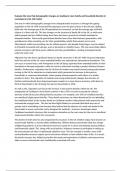Essay
Evaluate the view that demographic changes are leading to more family and household diversity in contemporary UK. [20 marks]
- Institution
- AQA
Evaluate the view that demographic changes are leading to more family and household diversity in contemporary UK. [20 marks]
[Show more]



